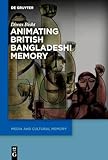Animating British Bangladeshi Memory / Diwas Bisht.
Material type: TextSeries: Media and Cultural Memory ; 42Publisher: Berlin ; Boston : De Gruyter, [2024]Copyright date: 2025Description: 1 online resource (XII, 207 p.)Content type:
TextSeries: Media and Cultural Memory ; 42Publisher: Berlin ; Boston : De Gruyter, [2024]Copyright date: 2025Description: 1 online resource (XII, 207 p.)Content type: - 9783110996210
- 9783110982886
- 9783110982473
- online - DeGruyter
- Issued also in print.
| Item type | Current library | Call number | URL | Status | Notes | Barcode | |
|---|---|---|---|---|---|---|---|
 eBook
eBook
|
Biblioteca "Angelicum" Pont. Univ. S.Tommaso d'Aquino Nuvola online | online - DeGruyter (Browse shelf(Opens below)) | Online access | Not for loan (Accesso limitato) | Accesso per gli utenti autorizzati / Access for authorized users | (dgr)9783110982473 |
PhD Loughborough 2022.
Frontmatter -- Acknowledgements -- Contents -- List of Figures -- 1 Introduction -- Part I: Memory Ecologies of the British Bangladeshi Diaspora -- 2 Mapping Generational Memory: From Partition to Prevent to Palestine -- 3 Reimagining Intergenerational Identities: From Ethnocultural to Postnational Belonging -- 4 Memory Ecologies: Intergenerational Transmission in a Changing Diasporic Landscape -- Part II: Animating Memory -- 5 Altab Ali and the Battle of Brick Lane: Animating Multidirectional Memories of the Bangladeshi Anti-Racist Resistance -- 6 Animating the 1947 Partition: Reorienting Diasporic Generations to postmemories of the Bengali Homeland -- 7 Conclusion: Undoing Race through Creative Memory Work -- Bibliography -- Index
restricted access online access with authorization star
http://purl.org/coar/access_right/c_16ec
The British Bangladeshi diaspora is located at a complex intersection in postcolonial Britain. It not only embodies the unfolding legacy of the erstwhile colonial empire but is also a critical site of contemporary debates around race, religion, and nation. Using an innovative interdisciplinary approach combining key concepts from memory studies, diaspora studies, and arts-based methodologies, this book locates how ‘hidden’ histories of colonialism, Partition, migration, and settlement, are implicated in the community's negotiations of the meanings of being British, Bangladeshi, and Muslim. Mapping key shifts in the temporal and spatial locations of three generations of British Bangladeshis through a diasporic memory ecologies framework, the book analyses how multidirectional anti-colonial and anti-racist memories are gradually forgotten as young British Bangladeshis increasingly mobilise a pan-Islamic identity framework to resist racialisation and alienation. Importantly, through varied case studies, it locates how reanimating mnemonic linkages across these intergenerational ecologies through creative memory work can help understand and negotiate the present-day realities of the postcolonial migrant condition in the UK.
Issued also in print.
Mode of access: Internet via World Wide Web.
In English.
Description based on online resource; title from PDF title page (publisher's Web site, viewed 20. Nov 2024)


